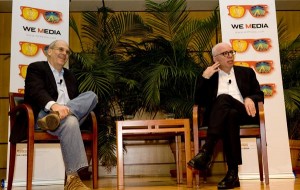Relevence, relationships and the ridiculous dominate opening day of We Media ’10

Alan Webber and Michael Wolff at We Media. 'Journalism is not a public service, not a public good,' Wolff said. 'Journalism is not social work.' Photo by Chelsea Matiash
By Steve Klein
and Suzanne McBride
Almost nothing may have been invented yet, We Media founders Dale Peskin and Andrew Nachison like to say.
But that doesn’t mean that a lot of people aren’t trying.
On Wednesday, the first full day of the 2010 We Media Conference at the University of Miami, “Game Changers” like Byron Reece, chief innovation officer of Demand Media, were celebrated and challenged to help define the approach of the Digital Renaissance.
“The Internet is becoming increasingly self corrective with the ability to determine between right and wrong, what’s good and bad,” said Reece. “Nobody saw the Internet coming. When new technologies come out, the only frame of reference people have are the technologies they are replacing.
“People are willing to help people on the Internet and get nothing in return.”
The anonymous — and not so anonymous — community of the Internet was a feature of the first of the two-day conference, which included a discussion on the changing face of news with Tom Curley, CEO of the Associated Press, and Alberto Ibarguen, CEO of the Knight Foundation, moderated by John Hockenberry, host of “The Takeaway.”
A pair of morning sessions, however, provided a sharp contrast between Newser founder Michael Wolff and Tom Stites, founder of the Banyan Project, which emphasizes relational journalism to strengthen democracy.
“Journalism needs to serve a huge, ill-served public and encourage deeper civic engagement,” said Stites. “This journalism would be more relevant to the public it serves to make sounder life decisions.
“We need to stretch boundaries and enlarge the discourse. The future of journalism discourse is what is important. What are the problems that democracy demands we pursue?”
Wolff’s approach is not as grand, however.
“Journalism is not a public service, not a public good. Journalism is not social work,” said Wolff, emphasizing the community theme. “When it’s healthiest, it’s about having a relationship with your readers. You’re trying to find what people want. That sends you in directions that are both profane and ridiculous.
“The truth about journalism is that it is most healthy when it is a business. The idea that the motivation should be that we are good people is a bad motivation.”
Wolff saved his harshest criticism for print journalism.
“Print will be a relic like the Broadway theater. Its time, its consequence has absolutely passed,” Wolff said in his own unequivocal style.
And just in case anyone missed the message, Wolff added, “Newspapers should die. Newspapers don’t deserve the stature they thought they had. They have no reason to exist. Newspapers haven’t done interesting journalism in a long time.”
Wolff began the discussion with a riff on some of the industry’s most noted leaders.
“He wants to be the guy who saves journalism,” Wolff said of News Corp’s Rupert Murdoch. “He won’t.”
Of The New York Times’ Sulzberger family: “Hopeless. Hapless. Ill-equipped to be running the company.”
But of The Washington Post’s Don Graham: “Nicest guy in the business; gives the Washington Post a chance. You want to believe in him.”
And Ariannna Huffington, founder of The Huffington Post: “I’ve never seen anybody work so hard at something. She keeps going and going and wears you down.”
Ibarguen and Curley engaged in one of the more cerebral interchanges of the day, putting the future of journalism in context of the past.
“This is a moment of both fear and opportunity,” Ibarguen said. “The printing press created a similar moment of disorientation and mistrust.
“Most newsrooms are now comfortable with the technology. Most are not comfortable with the empowerment that comes with it.”
Readers today have different relationships with information, Curley explained. Readers used to be much more passive. Now they “share, repurpose and manipulate the information. All of that,” Curley added, “affects the way you think about the experience from the reader perspective.”
The late afternoon sessions concluded with workshops on the role of nonprofits in filling the information gap, the importance of API’s (application programming interfaces) in linking content with users, and the over-riding theme of the day: community.
If you’re serious about engaging your audience, then you have to be willing to share control of the conversation, said Ben Ilfeld, chief operating officer of the Sacramento Press.
“You have to be really open to having a lot of crap on your site,” said Ilfeld, with Miami Herald Executive Editor Anders Gyllenhaal nodding — and laughing — in agreement.



